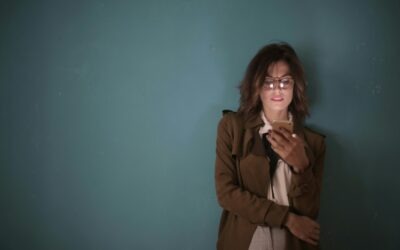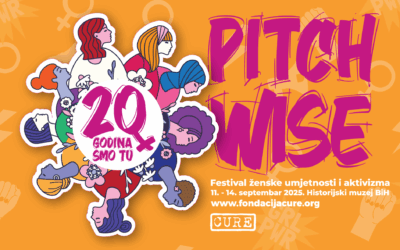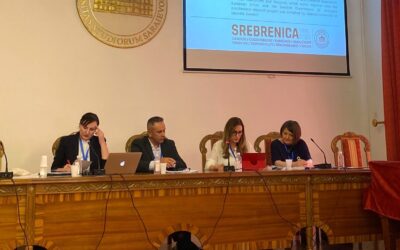What is your motivation for a such great work, especially in your country considering its history?
I am with the organization called The Peace people, and we have a good website that gives you a lot of background. What motivates me to work for peace is that I believe passionately in peace and I believe people can solve any problem through dialog and talking to each other. I have always worked for peace, but I particularly be committed myself in August 1976 in Belfast. One of my sister’s, Anne, three of her young children were all killed from a young Irish republican army fighter, in the clash between the British and Irish republican army. She was dangerously ill and subsequently died. So at that stage myself and some friends called for people to come out for peace, to stop the violence that was going on in our country. In August 1976 there was violence every day, bombing, shootings, killings from all sides, from paramilitric groups, loyalists, republicans, from the army and people were caught in the middle of this cycle of violence. In the response to our call for a peaceful solution and non-violent way forward, thousands and thousands of people came to the streets and march throughout north and south of the Ireland and in the other countries. I think the reason why we had such a fantastic response was that the message of rejecting the bomb and the bullet, all the techniques of violence, in order to build a peace touched a lot of people hearts. Since then I have always worked for non-killing and non-violent solution to problems. That was really started me and The Peace people in our community.
What kind of the message would you like to give to young women in politics in BH, and do you think they should be active and why?
I would say to young people to believe passionately in peace and possibility that peace can come. I believe that peace is a great gift but is also a right. We have a right to peace, it should be our right. Have that passion and work for peace because we live in communities where they have histories and they are often divided. We need to find ways of breaking down the divisions through talking to each other, through making the possible the ways that we can be together, working on projects. In our own country we have very deeply divided society, different ethnic groups, majority rule and minority not having human rights. When we started in the middle 60s in the Northern Ireland, we asked for basic civil rights for minority community, but tragically instead of those moving to give rights to a minority community and including them into the political process, violence broke out. Once violence breaks out it escalates because people become afraid and then once guns come into situation the fear really escalates and people are separate. For those of us living in situation of where communities are different religions, different tradition, an inequality between them, no real political part sharing, we need to find ways of bringing down the fear. So you take out the guns and you recognize that militarism and paramilitarism do not solve human and social problems. The only way to do it is through dialog, through listening each other, through understanding, and beginning to dealing with issues, because violence is just the surface not the root of the conflict. This is very important not to paper over the cracks but rather be honest and say this is why we have conflict and this is what we can do to remove it. That is how we started in our movement which contains from several communities, citizens movement, mostly women. When we marched 1976, after my sister’s children were killed, 90 % of people who marched were ordinary women and girls just saying: “Stop the violence sit down, talk”. That is a simple message but that is the important message. Talk to your enemies and make them your friends so that you can work together and bring our common humanity together. A common humanity is more important than diverse traditions, because it unite us, no matter how important traditions are. It is also important to recognize humanity and need for solving problems together. That approach to non-violence is important because of human rights and justice, as well for women rights, children, and poor. The voices that are ignored need to be listen and the voices of people that took a gun why did they take a gun with compassion and understanding. We need to have the politics of reconciliation, forgiveness and being prepared to speak to other people and not to have community politics of the revenge, of living in the past with history that keeps us separate. That approach we used in our situation, because in the Northern Ireland we have the communities which have split because of violence. We need to bring those traditions together, across the walls. We have had a great success. In 1976 bomb was thrown over Belfast, and people were afraid to go out because there were enemies and violence. Today we have started peace process, and we are building democracy. We come a long way, but we have also a long way to go. We need to work for our rights, women rights, economy, and jobs. As long as we go on, building and working for the changes we will have safe peace, but if we let it slip back and people feel there is no change there, a few extremist is enough to come out and take guns.
Do you have support of your family?
Yes, I have the most wonderful husband Jackie who is totally supportive of what I do and my family who in their own ways are all involved in community, supporting. In conflict human relationships are strength, and for some people it is important to fear that strength of family and friendship. These things make us strong in tragedies. When my sister Ann’s three children were killed she was dangerously ill. She recovered slightly to go on to have two more children with her husband Jackie and her son who had survived. She was so hurt physically and emotionally. She could not make it, and she took her own life. I think my sister Ann was an angel, but in tragedies like conflict and violence not everybody survives because their hearts are broken and she died of the broken heart. So, I think that is important, never ever conduct violence, because violence means that Ann’s, this world is not going to make it, and I am sure that you can multiply this story here. I had looked up for Ann’s children, married her husband and have got two more children with him. That is where my strength comes from. We have five children and six grandchildren and we have wonderful life, great life. We have us. So, I think it is important not to get stuck in the past, but to live happily in the present for your children. When children come in to the world, you want to give them a good life. We put a lot on in to happiness of our children and because of that we do not talk about past so much. Do not label the next generation with was our tragedy. There is a point you move on from it, let it go. There is a challenge in this for all. It is challenge to remember that people on the journey of the forgiveness are on the different points and we have to understand that, but also understand that forgiveness healed us and allows us to be happy. The key for the peace is to forgive. I will tell you one story about my sister. When she had learnt to walk after tragedy one of the first thing she has done was go to visit the mother of the IRA man. I said to her why did you go to her and she said: “Because she too had also lost her son”. She had actually known that kind of the forgiveness. We all were caught up by her strength. Forgiveness is important, and we do not want and should not carry on history to the next generation, if we carry on to the next generation it would never be healed. We never really forget the past, it is part of us, experience, but we can use it as learning tool what could we do different and how do we go forward to make sure that tragedy of the past is not reoccur.
What is difference in the peace building efforts and achievements in 80’s of the last century and today?
Today, I think there is recognition by many people that we have to change things that the world going down the road of militarism and war and is resulting of the poverty. It is putting us on very dangerous situation where instead of cooperating together in local communities, national level and world level we are fighting for our very human survival. We have to do things differently, and doing it through the ways of dialog, non-violence conflict resolution. There are massive movements around the world: women’s movement, the gender equality movement, the human rights, and many other alternative ways. That is growing all the time through the schools education, through the faiths and tradition coming together. We are being forced to recognize each other. In the Northern Ireland in the 70’s we had many very different Christian dominations and we never even spoke to each other. When the trouble started in the Northern Ireland those dominations started coming together, working together, building networks, having peace events, and today that movement is very strong. The way we link with other traditions, perceive what it means to be a part of some religion, what we have got a common with others and knowing that through dialog, is very important. The contact with people of different religion changes you to help moving your thinking forward. That is going to challenge us in sense to learn how to listen each other because of our different language and history. We all are shy and nervous up to other culture and tradition. We have to learn all our security zones and so that we can cope with this. But the real growth is stepping out of that security zone to the uncertainty. So whenever you see as I have seen people from different countries particularly young people go on a boat from Cyprus to try to go to Gaza to bring in aid and food to the children in Gaza that changes you. It changes you, because you are not talking about your differences you are talking about how to help them. Fact that people from different religion and tradition are working together on the project is wonderful experience. In Northern Ireland we had organized camps for the young people to see how the other people live in other part of the world.
How much the civil society can contribute to peace building, how much is up to them?
The civil society is alternative in today’s world in many situations, because we have governments whose policies, foreign policies are often not reflective of the needs of us as citizens. We see that in foreign policies of American government, British government, we can mention it all. They are all focused on trying to solve problems through war and conflict. Citizens need to challenge the policies of government when we see they are not good policies. Politicians are supposed to serve us not the way around. If we say that policy does not suit me and we network and cooperate than we have incredible possibility to change that. The civil community is the most powerful force in the world today. If you have on this side the people using violence and extremist and on this side governments and they are a lot in the combat, the civil community is the linking part. They are the ones who build the bridge that allowed us coming together and that is rule that we held on in Northern Ireland. We were the ones making space for paramilitarists and politicians to come together. We were forcing them through dialog. Every war has come to the end and you do it that by sitting down the table so why wait forty years when you can do it now.
In the global perspective what are the geographical areas that should be centers, where the strongest peace building efforts should made? Is it still the Balkan or other part of the world?
There are so many areas in the world where we need preventive diplomacy. We need be able to see where the problem is going to happened, so we need to be good in playing chase. The UN and other organization need to help the people on the grounds that are doing the peacemaking, because they are the peacemakers. The outsider cannot come in and say this is the way you want to go. You have to respect what the people want themselves, because the past showed that outside intervention does not work. We have to help the people who are working on the ground. There are many areas but the best peacemakers are the people themselves, who decided to take a bit in to their own hands and build the peace. We went to Syria two years ago and spent there one week listening what is happening and supporting people on the ground. It was very important experience because we have learnt what is happening in the Syria. Wherever conflict is, encourage and support the people on the ground to build the peace through non-violence, particularly the women. Women are great peacemakers. In the Northern Ireland the women realized that whenever the political peace process was starting there were not enough women’s voices. So they went together and found political party Women’s coalition and they got two seats at the table. They brought the real issue on the table of women, children and prisoners. They also helped when the people were fallen out living the table, the women were those one who tried to calm the situation and find the solution. I personal never become a politician because it is not my calling, and I see another way to work. But women have important voice and they need to be in political scene.
Your message from Sarajevo to the world?
It is a wonderful world. Believe in beauty of the people and work for antimilitarism and peace.


